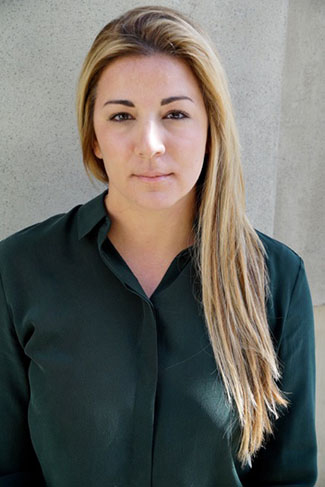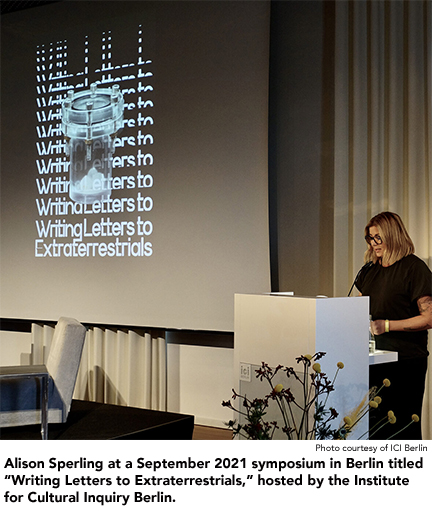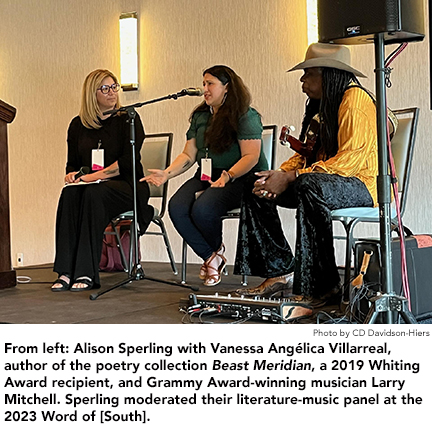Assistant Professor Alison Sperling has found a rich environment in the English department for her research and her teaching
By Alejandro Caballe
Alison Sperling hails from Oakland, California, and she traveled around the world as a student, a teacher, and a researcher before she became an assistant professor of English at Florida State University.
Given her academic exploration across a wide array of topics, including ecology, climate and science fiction, and feminist theory, amongst many others, it is no surprise that one of the core values Sperling  holds is the need for science and humanities disciplines to cooperate and work together, even if the process is a challenging one.
holds is the need for science and humanities disciplines to cooperate and work together, even if the process is a challenging one.
“The language and the discourse are so different, it takes a while to find common footing and figure out what foundational concepts and ideas we need to educate each other on before we move on to grander ideas,” Sperling says.
FSU hired Sperling in the spring of 2022 in the department’s Literature, Media, and Culture Program, and she arrived on campus at the beginning of 2023.
“Dr. Sperling’s research profile was incredibly impressive, and her application immediately rose to the top of our short list of candidates,” says English Professor and LMC Program Director Candace Ward. “We were excited by the work she was doing in Berlin, of course, and the interdisciplinary reach of her scholarship and teaching, which, we felt, would complement and enhance our department's offerings in environmental studies as well as contemporary popular culture, science fiction, and queer and feminist theory.”
Sperling’s time in Berlin stretched from 2018 to 2022, first with a postdoctoral research position at the Institute for Cultural Inquiry Berlin, studying radioactive natures and nuclear aesthetics. She then stayed in Berlin for a second postdoctoral position at Technical University Berlin where she researched feminist science and technology studies for two years as one of the only humanities researchers on her research team.
Science fiction is one of Sperling’s areas of expertise; she especially appreciates how speculative fictions can engage interdisciplinary conversations and research. She earned her double bachelor’s degree in English and Philosophy at the University of Miami, before earning a master’s degree in English at San Francisco State University. Her doctoral degree in English, Literature, and Cultural Theory is from the University of Wisconsin-Milwaukee, where she completed her dissertation, “Weird Modernisms.”
Sperling notes that the diverse worlds and beings created in works of ecological science fiction, one of her core areas of study, unsurprisingly, are better attended to with a more comprehensive understanding of biological and ecological concepts.
“I think science fiction as its own kind of site for theoretical thought,” she says. “It posits its own worldview… I don’t necessarily use science fiction to get theory, or vice-versa, I think of them as informing one another toward imagining the world differently, better, and finding real strategies to make it so.”
 The Spring 2023 semester is Sperling’s return to teaching in the U.S. after teaching in an Ecology Futures program at the St. Joost Academy of Art and Design in the Netherlands and co-teaching a course on “Global Weirding” in American Studies at Technical University Dresden in Germany. She says she has found the experience at FSU extremely enriching already and has been impressed by the quality of student work and engagement. She leads classes in queer science fiction and contemporary American literature and the environment.
The Spring 2023 semester is Sperling’s return to teaching in the U.S. after teaching in an Ecology Futures program at the St. Joost Academy of Art and Design in the Netherlands and co-teaching a course on “Global Weirding” in American Studies at Technical University Dresden in Germany. She says she has found the experience at FSU extremely enriching already and has been impressed by the quality of student work and engagement. She leads classes in queer science fiction and contemporary American literature and the environment.
“The students are super smart, enthusiastic, kind, and generous,” Sperling says. “Both of my classes are full, which is wonderful, and shows that there’s really a need and desire for these kinds of classes.”
Daniel Zdrazil, a senior English-Creative Writing major, is in Sperling’s Queer Science Fiction class, and he says it is one of the best he has taken at FSU.
“Dr. Sperling has managed to bring us better together as a class by encouraging discussion amongst ourselves with great prompting questions from her and new, fun, and strange materials,” adding that Sperling has, “made discussions on the materials fun, safe, and really thought provoking.”
Ward says that her faculty colleague “has jumped into departmental life with great good will since arriving in Tallahassee in January.” “She believes in the importance of showing up for faculty and students, of really engaging with people,” Ward says, quickly listing the positive characteristics she brings to the department. “That's easy: energy, compassion, and a great sense of humor.”
Ward adds that Sperling has also "leapt into the local Tallahassee scene, arranging and participating in a number of community-facing readings and events.”
In the few months Sperling has been at FSU she has already made her presence felt in the community. On January 27, she led the first session of a Climate Fiction workshop, hosted by FSU Sustainable Campus. Attendees analyzed and critiqued climate-fiction, while also learning about the important theorists and concepts that make up the core of the genre.
“It was great,” Sperling says. “We talked a lot about what climate-fiction is and could, or should, do. Does it have a responsibility to operate in the world in some distinct way?”
In mid-April, Sperling joined co-founders English-Creative Writing alumna CD Davidson-Hiers, and local author Jeff VanderMeer on the board of the Sunshine State Biodiversity Group, a nonprofit supporting environmental efforts in Florida. The three organized and participated in a series of three discussion panels at Word of [South], a local festival of literature and music.
“The kind of community engagement that she prioritizes reminds us of why we, as university faculty, are here—not only for the students on campus, but for the wider community we live in,” Ward says.
Sperling speaks brightly of FSU and English department faculty as well, collaborating with faculty members in different departments to coordinate events, such as environmental reading groups and future co-taught classes.
“I’m in one of the most biodiverse regions in the country, which is particularly conducive to my research and interest in working collaboratively with scientists, biologists, and ecologists here,” Sperling says. “This is a really rich place to be and I’m thrilled.”
Sperling is currently finishing her first book manuscript on “Weird Modernism.” She summarizes the publication as one that views the modernist literary movement through what she identifies as an emerging field of Weird Studies that draws from philosophy, literature, cultural studies, geography, and the sciences. In the project, Sperling investigates some American canonical women writers in convergence with a theory of weirdness that she has developed, one that explores H.P. Lovecraft’s and the broader New Weird’s re-emergence in conjunction with feminist and queer theoretical approaches.
Sperling adds that the project “serves as an alternative historical and political backdrop to both the modernist moment and our contemporary moment,” and seeks to “shed light on the ecological and cosmological imagination by which these historical literary moments are linked.”
“The manuscript begins with Lovecraft, who is a troubled figure for his racist and xenophobic attitudes,” Sperling says, “and it explores why, despite these facts, he has, in certain philosophical and cultural studies circles, become this literary figurehead of the so-called anthropocene. It’s true that even outside of white, masculine, philosophical projects of the 2010s, that my project critiques, we still see that Lovecraft is everywhere…his legacy, in fact precisely because its abhorrent politics, is pervasive in popular culture as well as in literary fiction.
“He’s been revived even more recently by cultural producers of color like Jordan Peele, N.K. Jemisin, and Victor LaValle, who confront his attitudes towards racial and gender difference directly.”
I’m in one of the most biodiverse regions in the country, which is particularly conducive to my research and interest in working collaboratively with scientists, biologists, and ecologists here. This is a really rich place to be and I’m thrilled.
— Alison Sperling
Sperling’s study of the concept of "the Weird” extends beyond analyses of literary history and cultural touchstones.
“I’m interested in weirdness as a way of trying to understand or grasp our current ecological moment,” she says.
She prefers the term “global weirding,” rather than global warming, which she says better captures the unpredictability of the weather during climate crises. Weirdness has come to stand for things and ideas that are impossible to represent, she explains, and she wants to continue exploring this idea in ecological studies and writings.
In her teaching, Sperling wants to involve students on excursions outside of the classroom so they can become familiar with local groups and the many ways to effect change towards environmental and social justice in their community.
“I want to take the students out in the field where they can meet someone from, say, the Apalachee Riverkeepers, or the scientists at FAMU where they are working on soil core samples in our coastal regions, or researchers at the FSU Marine Lab who are working on oyster conservation. In the fall, I’m hoping to take the graduate students dip-netting with Coastal Plains Institute to catalogue tadpole populations, too, to learn about different forms of collecting scientific data (like citizen science projects) and then to think more deeply about how we construct stories around this kind of material,” Sperling says. “I want them to understand the relation between the fictional narratives about ecological processes and the kind of work that researchers in the sciences are doing in the field.”
Sperling looks forward to the Fall 2023 semester, when she will teach her first graduate course at FSU on Literature and Gender, called “Queer Ecologies” as well as teach the queer science fiction class for the second time.
Alejandro Caballe is double majoring in English-Editing, Writing, and Media and international affairs.
Follow the English department on Instagram @fsuenglish; on Facebook facebook.com/fsuenglishdepartment/; and Twitter, @fsu_englishdept
